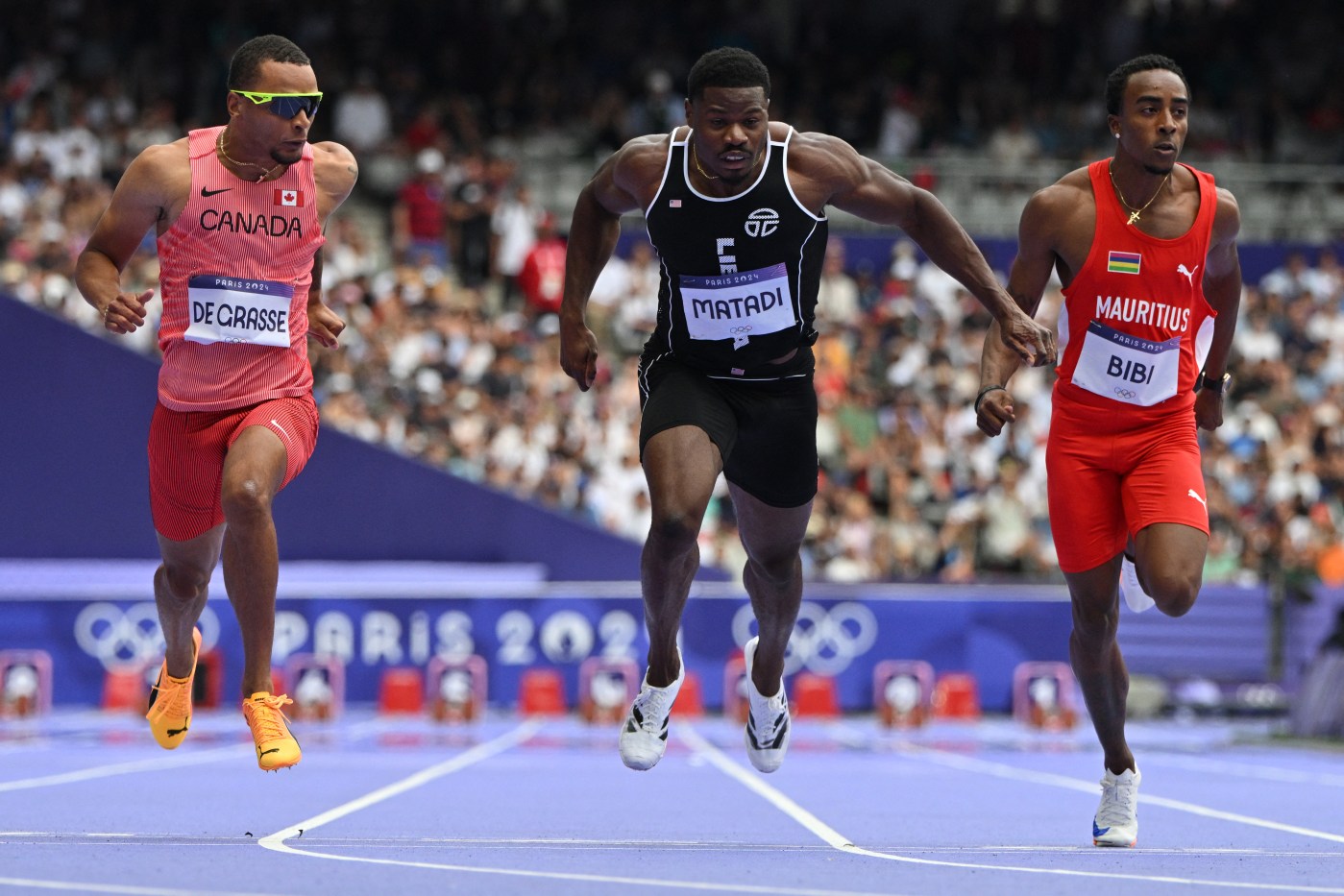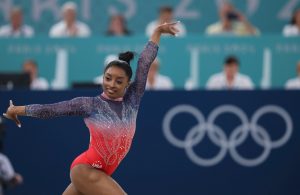
‘Minnesota 4×100’: Liberia’s men’s relay is full of Minnesota talent
Liberia needed a top-two finish in the 4×100-meter semifinals at the World Athletic Relays in May to clinch the relay team a ticket to the Paris Olympics.
But by the time anchor runner Joseph Fahnbulleh received the baton, Liberia was in fifth or sixth place, and out of contention for such a finish, or so it seemed.
“There’s always a chance,” Fahnbulleh said. “Anything could happen, so there’s always a chance.”
He snatched the baton and immediately set his sights on the next runner in front of him, then the next and the next.
“My main focus is trying to pick them off one by one. If a guy is two meters ahead, alright, cool, I can go get him. And then the other guy, and then the other guy. And at that point, cool, let’s just catch as many people as we can.”
The 2019 Hopkins High School graduate ran the relay split of a lifetime — he never got the actual time, but he believes it was sub-nine seconds.
“I think that’s the fastest I’ve ever gone in a race,” said Fahnbulleh, who will race in the individual 200-meter semifinals at 1:02 p.m. Central on Wednesday. “You try to emulate what you do in practice in an actual meet, and I feel like that’s the closest I’ve ever been. When you run for your other countrymen, you just have another gear.”
But was it enough?
“My expression was pure — I had no idea,” Fahnbulleh said. “It was close, and I actually dipped this time. It wasn’t like NCAAs, where I just ran through the line. This time, I dipped, and I was like, ‘Ah, I don’t know.’ ”
“Nobody really knew the time,” Liberian teammate Emmanuel Matadi said.
That question hung in the balance seemingly forever, though it was more like 30 seconds. Germany won the relay, but the second spot was determined by a photo finish between Liberia and Switzerland.
Then the name popped up on the board by the number 2: Liberia.
A new national record time of 38.65 seconds sent the Liberian relay to the Olympics.
Fahnbulleh’s face was overcome with shock as he darted toward his teammates, who immediately entered a state of euphoria.
“Being a part of that relay was really historical,” 2015 North St. Paul grad Akeem Sirleaf said. “I can’t find the words, but being a part of that relay and having those three other guys on the relay, it just meant a lot to me, because we never had a relay on the biggest stage. We put together everything on that day just to make everything happen. It still feels surreal.”
Matadi, a 2009 St. Paul Johnson grad, is generally known for his stoicism, but that wasn’t an option in the race’s immediate aftermath.
“In that moment, it overcame me when I seen the guys were extremely, extremely happy,” Matadi said. “It was unreal, really.”
In more ways than one. Yes, Fahnbulleh’s finish was hard to believe. But just as fairytale-like has been the Olympic program’s rise.
When Matadi qualified for the Rio Olympics in 2016, he was one of two Liberians to compete in the games. Five years later, Fahnbulleh and Matadi were the only two Liberian male athletes in Tokyo. Matadi wanted more for his home country. Liberia has never won an Olympic medal.
It’s a big reason why he’s still running at age 33 — years after many sprinters retire. He feared if he hung up his shoes too early, there was potential for another long gap between athletes.
“No one wants to be the first and the only one doing something,” Matadi said. “So I think, for me, it was like, ‘OK, last long enough, be able to do well enough to make it an attractive thing to do, a cool thing to do to be able to come and represent your home country.’”
He not only competed for the team, but he contributed to its evolution. The two-time Olympic flag bearer for the nation in the Opening Ceremony connected the team with famous designer Telfar Clemens, a fellow Liberian American who has since designed the country’s Olympic gear.
And Matadi has played a large role in recruiting other athletes to the delegation.
“I got here when the ball was already rolling,” Fahnbulleh said. “Matadi got here from Ground Zero — there was no ball. There was no sponsor, there was no anything. It was just him. He had to thug it out the whole way through and learn on the fly.”
Part of his challenge was to recruit others to the team. That involved a number of conversations usually centered on trying to build something together for a nation.
“Trying to get like-minded Liberians. That’s the only way it works, right? People that are like-minded and after the same goal,” Matadi said. “So that was the process, really. Just having conversations with people who were running, figuring out who was Liberian that was in college or pros running. So it was a whole process, but it worked out.”
Funnily enough, many of the right fits happened to, like Matadi, have strong Minnesota connections. Sirleaf, Fahnbulleh and Matadi all grew up in the metro. The fourth member of that 4×100 at the World Athletic Relays was Jabez Reeves, who is from Virginia but now attends Minnesota State Mankato, Matadi’s alma mater.
“The Minnesota 4×100,” Matadi joked.
Sirleaf is an alternate for the Olympic relay — the first round of which begins at 4:35 a.m. Central on Thursday, with the final set for 12:47 p.m. Friday — after suffering an Achilles injury. The fourth runner in Paris is set to be John Sherman, a Tennessee product. But that there’s such a strong Minnesota influence on the Liberian relay isn’t a surprise. Minnesota has the largest Liberian population in the United States, many of whom were refugees who fled their home nation during the 1990s and early 2000s when the country was in the midst of civil war.
“It makes sense why we all have ties from there,” Fahnbulleh said.
What’s interesting is that, while Fahnbulleh, Sirleaf and Matadi all ran high school track in the metro, they didn’t know one another ahead of this experience. Sirleaf noted he believes he saw Matadi race for Johnson, but he’s not even sure of that. Matadi is 10-plus years older than Fahnbulleh. But they’ve formed a strong bond through this process. Matadi said there’s a group text chat that keeps them all connected. The Minnesota bonds surely help, but the sprinters agree more so it’s the tight-knit feeling of Liberia’s small delegation.
“We’re able to connect easier than having a big team like a Team USA or a Team Jamaica,” Sirleaf said. “Because we have a small team, we’re able to bond easier, bond faster and just have a relationship outside of what we do.”
The common goal helps, as well.
“It’s really nice just seeing from where we started — Ground Zero — to where we are now and how far we can go and take it,” Fahnbulleh said.
And Matadi is the forefather of it all. The other runners feel that, and seemingly want to perform for him. As they got ready to head out for the semifinal race at World Relays, Sirleaf looked at Matadi and said, “I got you.”
Matadi takes “a lot of pride” in Liberia reaching the point where it can run a relay in the Olympics.
“And yeah, I did play a role, but I don’t really see it like that,” Matadi said. “Obviously, I did have my part to do with it, but I really just see it as people trying to go get it. Everything just aligned, the stars aligned.”
All the athletes shared the feeling that comes with running with and for your fellow countrymen. This is the fun part. Fittingly, this relay will be Matadi’s final Olympic race.
“It’s different when you can share your joy. I always say to my friends and to my people, ‘If I can share my experience with you, then I will.’ Because a shared joy is better than alone. It’s a feeling that’s like no other,” Fahnbulleh said. “And especially to do it when the team lead (Matadi) is in his last year. It just meant a lot more.”
“Yeah,” Sirleaf said, “it’s going to be pretty special.”
Related Articles
Column: The highlights and lowlights of watching the Olympics so far
How timekeepers determined Noah Lyles won 100 meters by slimmest of margins
Jeweler shares story behind Simone Biles’ iconic goat diamond necklace
The final image of Simone Biles at the Olympics was a symbol of joy — and where the sport is going
A beginner’s guide to Olympic Artistic Swimming


